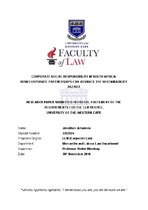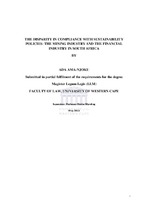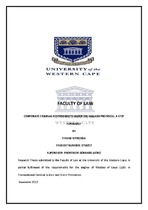Corporate social responsibility in South Africa : how corporate partnerships can advance the sustainability agenda
Abstract
Corporate Social Responsibility (CSR) is not a new issue. There has and will always be the need for organisations to make profits and the needs of society. CSR has been considered more strongly than ever since the early 1990's, building on a trend that had been growing since the start of the 20th century. CSR broadly refers to all of an organization's impacts on society and the need to deal responsibly with the impacts on each group of stakeholders. The King IV Report on Governance for South Africa 2016 encapsulates the idiosyncratic South African context of CSR. In the African context these moral duties are manifested in the concept of Ubuntu which is captured in the expression 'uMuntu ngumuntu ngabantu', 'I am because you are; you are because we are'. This model being the premise upon which the CSR partnership is researched herein. Ever since the publication of the King Reports on Corporate Governance, South African businesses have sharpened their focus on their commitment to the 'triple-bottom-line'. It is impossible for organizations to ignore the impact of social, ethical and environmental issues on their business and the economy and the cost of neglecting these issues will be high. CSR has gained increasing prominence as a result of increased stakeholder demands, limitations of government and civil society to address complex societal issues, and the realization by most businesses that their sustained success depends on their ability to address local sustainable development challenges. Corporate sustainable development, despite not being a business' core responsibility, is doubtful to be achieved without the support of other businesses as they represent the productive resources of the economy. Although there is consensus that businesses have a vital role to play in addressing sustainable development challenges, companies still have a responsibility to more traditional elements of what constitutes business success. In this regard companies have to meet somewhat conflicting expectations of markets and stakeholders, the economic bottom line being a dominant factor in decision making. Companies therefore may not be able to meet the level of resources essential to achieve the scale and impact so as to address the challenges of these competing priorities. For business to effectively move the sustainability agenda forward, there is a need for a systemic approach, as sustainability cannot succeed in an unsustainable system. In order to achieve the scale, speed and impact necessary, an integrated approach that leverages key role players is critical to drive change and support sustainability. It is in this regard that this research paper will explore, the wider definition of regulation 43(5) (a) (ii) (bb) published in relation to the Companies Act and whether it provides for corporate partnerships, if so, does it achieve contributions to community development and does this advance the corporate sustainability agenda.
Collections
Related items
Showing items related by title, author, creator and subject.
-
The disparity in compliance with sustainability policies: the mining industry and the financial industry in South Africa
Ama-Njoku, Ada (University of Western Cape, 2012) -
Corporate criminal responsibility under the Malabo Protocol: A step forward?
Nyirenda, Fannie (University of the Western Cape, 2018)Traditionally, domestic criminal law was focused on individual guilt as can be seen from the principles of punishment, which are closely linked to blameworthiness and the infliction of loss or punishment to the offender. ... -
Labour rights and working conditions in corporate codes of conduct: an assessment of the legal dimension, in different national contexts, of selected multinational corporations’ corporate social responsibility commitments
Tiemeni, Thierry Galani (University of the Western Cape, 2015)At the heart of this thesis is the notion of Corporate Social Responsibility (CSR), an innovative concept deep-rooted in the globalisation phenomenon. The notion of CSR entails the much-debated duty of businesses, not only ...




